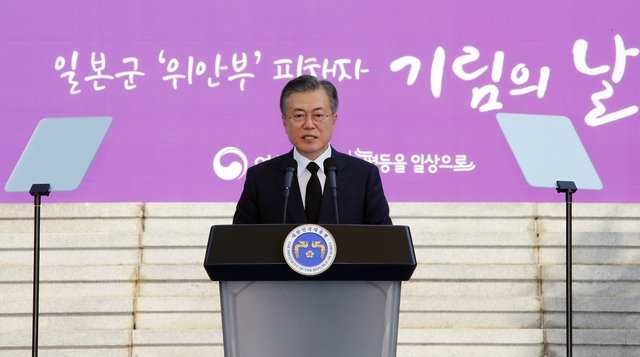 |
|
South Korean President Moon Jae-in and First Lady Kim Jung-sook attend a ceremony for the Memorial Day for Japanese Forces‘ Comfort Victims at the National Mang-Hyang Cemetery, a cemetery for Koreans who died overseas, in Cheonan, South Chungcheong Province. (Yonhap News)
|
Remarks imply need for fundamental soul-searching regarding human rights
Referring to the issue of the comfort women for the Japanese imperial army on Aug. 14, South Korean President Moon Jae-in said, “I don’t think this is an issue that can be resolved through diplomacy [between South Korea and Japan].” “This issue will only be resolved when the whole world – including Japan and we ourselves – learn a lesson from this and firmly resolve to reflect deeply on the issues of human rights and sexual violence against all women and to prevent them from happening again,” Moon said. Moon made the remarks during a ceremony for the Memorial Day for Japanese Forces' Comfort Victims that was held at the National Mang-Hyang Cemetery, a cemetery for Koreans who died overseas, in Cheonan, South Chungcheong Province. “I don’t want this issue to lead to a diplomatic conflict between South Korea and Japan. The comfort women issue is not only a historical issue between South Korea and Japan, but also represents the issue of sexual violence against women in wartime, as well as the universal human issue of women’s rights,” Moon said. Moon’s comments are taken to mean that while he will not ask for the comfort women agreement that the administration of former president Park Geun-hye reached with the Japanese in consideration of South Korea-Japan relations to be renegotiated, but he will continue to ask Japan to engage in some fundamental soul-searching about the comfort women issue, which was a human rights violation. Moon went on to explain why Memorial Day for Japanese Forces' Comfort Victims had been designated as a national day of remembrance. “Twenty-seven years ago, the late Kim Hak-sun became the first former comfort women to publicly testify about her experience. This significant ceremony was made possible by the bold and courageous action of the surviving comfort women during the nearly three decades since then,” he said. “These women have sublimated their pain and suffering and at this very moment are putting into practice peace and human rights. It’s our task to establish justice and to correct history that has disregarded the truth.” Issue of universal human rights, not diplomacy Moon’s remark that the comfort women issue is not “an issue that can be resolved through diplomacy” appears to imply that he intends to approach it not as a diplomatic issue between South Korea and Japan but as an issue of universal women’s rights. Furthermore, he didn’t directly target the Japanese government in this speech, in contrast with his congratulatory speech for Liberation Day on Aug. 15 last year and during his commemorative address for the March 1st Movement this year. Moon’s remarks are understood to mean that the South Korean government will reduce its messaging to Japan, which has no intention of offering a genuine apology or showing remorse, while seeking the support of the international community through designating the comfort women day as a national day of remembrance, launching an institute for researching the comfort women issue and bolstering other follow-up measures in education and other fields. Moon also now appears to be emphasizing practical steps after the government finished reviewing a plan for implementing follow-up measures that the government announced in January and the activity of a task force that carried out an assessment last year of the comfort women agreement, which was reached on Dec. 27, 2015. “We will make a proactive and concerted effort that will include unearthing, preserving and expanding records; supporting research; and providing education,” Moon said, underscoring the government’s role. “The president is suggesting that we take a forward-oriented approach to relations with Japan while calling on Japan to undergo a more fundamental awakening,” said a senior official at the Blue House. As soon as Moon arrived at the site of the ceremony, he greeted former comfort women Lee Yong-su and Gwak Ye-nam with a warm embrace and then laid a wreath at the cemetery.
 |
|
South Korean President Moon Jae-in and First Lady Kim Jung-sook pose for a commemorative photographer with descendants of Korean independence fighters on Aug. 14 at the Blue House. (Blue House photo pool)
|







